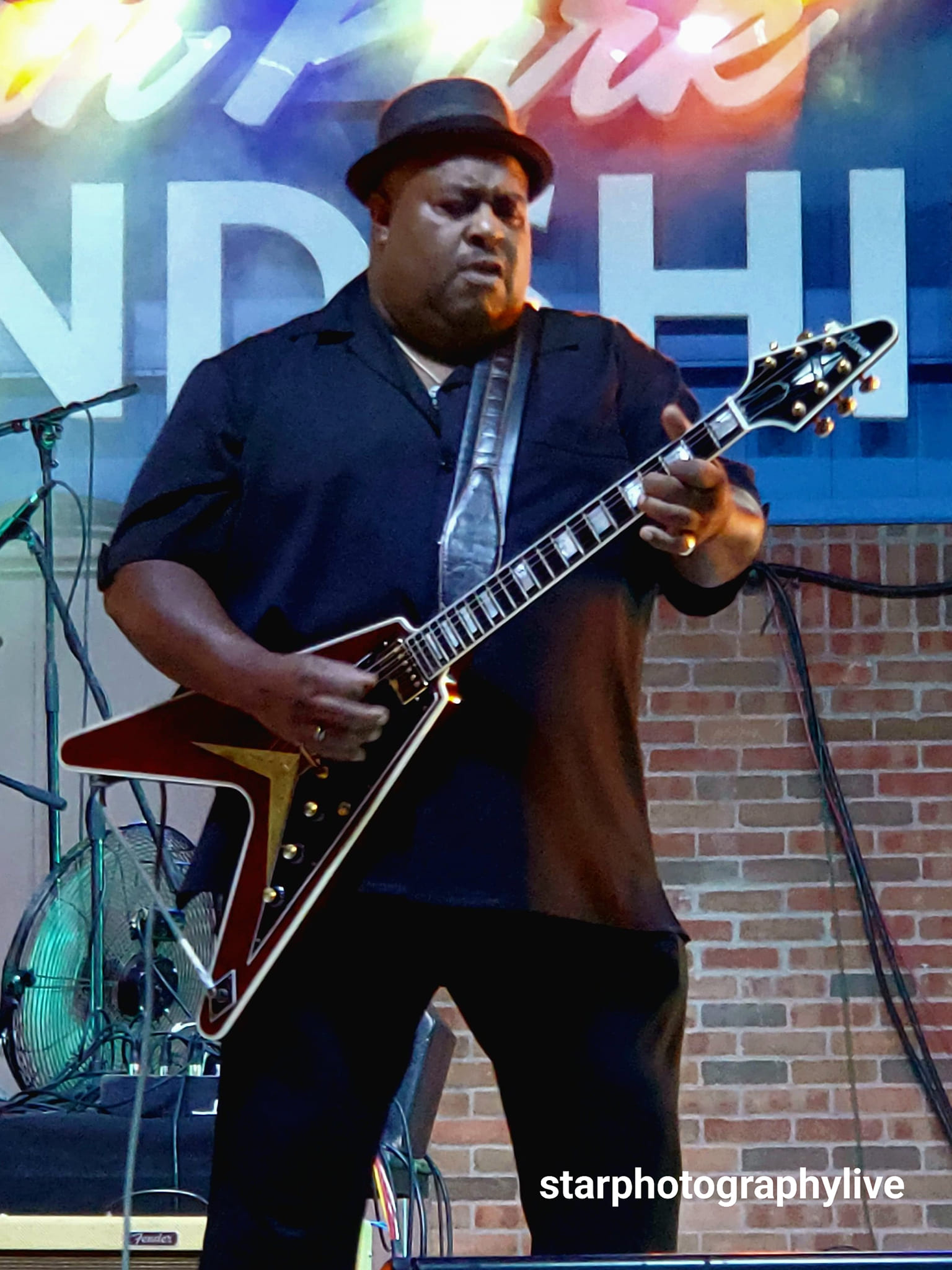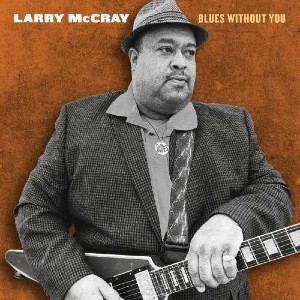Over the last three decades Larry McCray has emerged as one of Michigan’s greatest blues artists. Born in 1960 in Magnolia, Arkansas, he spent his early years on a farm as the second youngest of nine siblings. He grew up during the time that Jim Crow laws were officially off the books, but racial discrimination was still practiced openly.
His family moved to Saginaw, Michigan, in June of 1972 because of the hard times in Arkansas and for the economic opportunities offered in the state’s automotive plants. After trying his hand at saxophone in school, his older sister Clara, who had played the blues in a band in Arkansas, introduced Larry to the guitar and the transformative music of the three “Kings of the blues” (B.B., Freddie and Albert). “I played in the school band from seventh to 12th grade, but I loved the guitar. My aspiration when I started playing was to get blues music the same respect that other genres did,” Larry recalled.
Following his graduation from high school, Larry took a job on the assembly line at a local General Motors plant. The automotive plants were thriving in Michigan at that time, and there was lots of work. In the early 1980s, he and his brothers Carl (bass) and Steve (drums) began performing in local bars and music clubs as the McCray Brothers.
By the late 1980s, Larry’s guitar and vocals had attracted the attention of Virgin Records executive John Wooler who had recently started a subsidiary label, Point Blank Records, featuring blues, soul and Americana artists. He signed Larry McCray as his first artist. Larry’s debut album, “Ambition”, was recorded in a friend’s Detroit basement studio and released in 1990 to critical acclaim by fusing elements of blues, rock, and soul to create a contemporary blues sound.
His brothers Steve and Carl played on three songs on the “Ambition” album, but Larry didn’t write any of the songs. He went on the road to support it with Gary Moore. The Northern Irish guitarist, who had returned to playing the blues after a stint in heavy metal, was the headliner. Moore complimented Larry on his playing and he gave him an autographed Stratocaster guitar at the end of the tour.
Throughout the 1990s, Larry continued to help define blues rock by collaborating with artists such as fellow guitarist Albert Collins who was also signed to Point Blank. Playing music on national stages also allowed him to meet and get to know on a first name basis blues heroes like B.B. King, Buddy Guy, Albert King, Junior Wells, and Luther Allison.
In 1993, Larry released “Delta Hurricane.” Produced by British blues maven Mike Vernon and recorded in Memphis, it was a true band album rather than a demo on which other players contributed. A horn section played on many of the songs and Steve McCray was featured on drums. The critically acclaimed album’s highlight was Larry’s cover of the Warren Haynes song, “Soul Shine.”
His follow-up album, "Meet Me at the Lake with the Bluegills” failed to maintain the career momentum generated by “Delta Hurricane.” In 1997, Larry contributed a great cover of “Midnight Rambler” to “Paint It Blue: Songs of the Rolling Stones”. Also contributing performances were other blues greats including Taj Mahal, Luther Allison, Junior Wells, Lucky Peterson, Willie Dixon, and Alvin Youngblood Hart.
Next up for Larry was 1998’s “Born to Play the Blues” album. In 1999, McCray recorded an excellent cover version of Bob Dylan’s “All Along the Watchtower” for the tribute album, "Tangled Up in Blues”.
In 2000, McCray founded his own independent label, Magnolia Records, and “Believe It” was its first release. The same year, McCray played alongside Jimmy Thackery as guest guitarists on Sista Monica Parker’s album, “People Love the Blues.” Magnolia released McCray's first live album, “Live on Interstate 75,” in mid-2006. This was followed with “Larry McCray,” in 2007.  McCray at the Friendship Shell in Bay City.
McCray at the Friendship Shell in Bay City.
In 2013, Larry was diagnosed with prostate cancer. His marriage fell apart and he was divorced a year later. His ex-wife was then sentenced to 18 months in prison for fraud, leaving him to raise their teenage son alone. “I’m better now, but that cancer felt like I’d consumed lit charcoal straight from a barbecue. I could sleep for 16 hours and wake up feeling like I hadn’t been to bed in a week,” he told Chris Lord of The Guardian. “I gained a lot of weight because of complications with the surgery. The day I came home from the hospital, my stitches ruptured and I had a hole that was about 2 inches deep. It took a long time to heal.”
Be it his serious health issues, questionable management decisions, the quality of some of the material he recorded, or just bad timing, none of those releases and three decades of nonstop touring took him to the next level. It was frustrating because in three decades of nonstop toring Larry had played and shared the stage with such blues greats as B.B. King, Buddy Guy, Albert King, John Mayall, Johnny Winter, Robert Cray, Keb Mo, Jimmie Vaughn, and Kenny Wayne Shepherd, as well as rock legends the Allman Brothers, Phil Lesh, Jonny Lang, Joe Walsh, Levon Helm, Chris Robinson, Dicky Betts, and countless others.
In the years leading up to the Covid-19 pandemic, McCray had been at a low ebb. “The pandemic saved my life,” he revealed to Chris Lord. “It gave me time to rest my body, gather my thoughts and write some songs. It was the first time I’d had a break since the late 80s. I had to be out there working and hustling all the time to maintain a living.”
That flush of 90s success had soured after McCray made “bad decisions in bad situations”; he took out his inability to match his peers’ successes on himself, and lived to excess. “I was self-abusive,” he told Lord. “I’m not one to make excuses. [The lack of success] was frustrating because I could’ve played the guitar standing on my head and it wouldn’t have been enough.”
He cut out some bad habits – “I’m not into all the drinking, smoking, chasing women and having a wild time any more," he said. But by the time of the pandemic, McCray thought his career was over. “I love music and I play all the time for myself, but I had accepted that people didn’t want what I had to offer. I had to find peace and happiness in my life.”
His fortunes finally changed with a phone call from Joe Bonamassa, who asked if they could make an album together. “Larry’s still a relatively young man, with a lot to say, and the world needs to know who he is. It’s the perfect time to have a rebirth of his music,” Bonamassa said. “He knows he’s a badass, he just needs to be reassured and reassure himself that he can stand up there with the greats.” 
In 2021, “Blues Without You,” a 12-track release was recorded in Los Angeles on Joe Bonamassa’s Keeping the Blues Alive nonprofit label with producer Josh Smith, a partnership that has also spawned a video (for the single, “Arkansas”) and a documentary. McCray’s sound is an interesting mix of the Delta blues – the raw acoustic music that originated from the Mississippi Delta in the early 1900s – and the later Chicago blues that brought heavily amplified electric guitars into the mix. A new album on Bonamassa’s label is scheduled for 2025.
McCray currenty lives in Bay County with his partner Peggy Smith who serves as his collaborator, assisting with lyrics and arrangements. They met at one of his gigs, and he has said that his relationship with Peggy is one of the best things to come out of his career. He is also very proud of his son, Bleau McCray-Morel, who has developed into a fine singer and guitar player in his own right.
Larry McCray's talent and career have been recognized with a Lifetime Achievement Award from the Detroit Blues Society and the Sonny Payne Award for Blues Excellence. In 2024, Larry was inducted into the Michigan Rock and Roll Legends Hall of Fame.
Sources:
Divorce, Illness, Failure… How Musician Larry McCray Beat His Own Blues by Chris Lord - The Guardian 2022
MMHP989 interview 2022
Wikipedia: Larry McCray and Delta Hurricane
Larry McCray Live website

